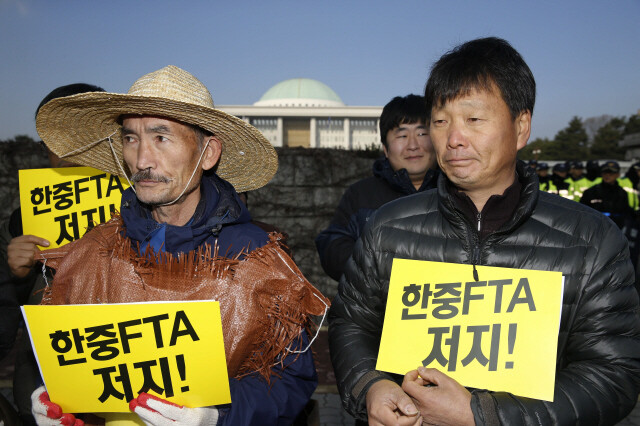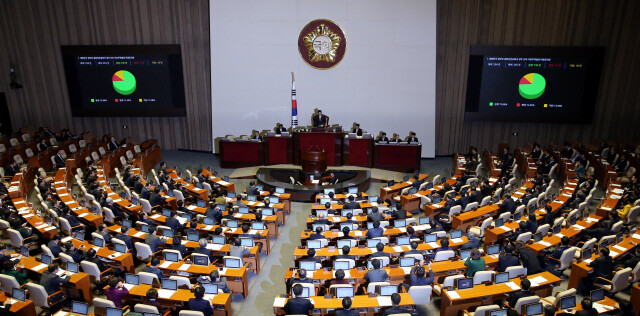hankyoreh
Links to other country sites 다른 나라 사이트 링크
National Assembly ratifies S. Korea-China free trade agreement

On Nov. 30, the South Korea-China free trade agreement was ratified by South Korea’s National Assembly.
“Eliminating tariffs will help South Korean companies secure price competitiveness over companies from other countries in the Chinese market and will help South Korea maintain its number one rank in market share in imports to China. We are planning to take the necessary measures with all possible speed to enable the agreement to take effect within the year,” the South Korean government said.
But small-scale merchants and manufacturers, along with the farming, fishing, and forestry sectors, are voicing their concern about the harm that could be caused by more imports of low-priced Chinese products.
During a full session of the National Assembly that took place around 5 pm, with 265 lawmakers attending, the resolution to ratify the FTA passed, with 196 in favor, 33 opposed, and 36 in abstention. This came six months after the agreement was officially signed by President Park Geun-hye and Chinese President Xi Jinping on June 1.
The ruling and opposition parties also passed a supplementary resolution calling for the National Assembly to continue to assess whether the FTA is being implemented in a way that is in the national interest and for the South Korean government to hold deliberations with the Chinese government regarding ways to improve the FTA.
The National Assembly also passed bills ratifying free trade agreements with Vietnam and New Zealand.
At 2:20 pm, four members from each of the two main parties - along with Na Kyung-won, chair of the National Assembly’s Foreign Affairs and Unification Committee - convened to reach a final agreement on the bill to ratify the South Korea-China FTA, which had been a major source of controversy.

In the meeting, the Saenuri Party (NFP) was represented by Party Leader Kim Moo-sung, Floor Leader Won Yoo-chul, Policy Committee Chair Kim Jeong-hun, and Senior Deputy Floor Leader Cho Won-jin, while the New Politics Alliance for Democracy (NPAD) was represented by Party Leader Moon Jae-in, Floor Leader Lee Jong-geol, Policy Committee Chair Choi Jae-cheon, and Senior Deputy Floor Leader Lee Chun-seok.
After the leaders of the ruling and opposition parties reached a tentative agreement on the FTA early on Monday morning - following a marathon session of negotiations that started on Nov. 26 and lasted for four days - the agreement was adopted by general meetings of both parties that morning.
“I hope that the FTA with China will contribute in some small way to providing stimulus the economy,” Kim Moo-sung said during the meeting.
“Since South Korea is a commerce-based country that is highly dependent on trade, we have no choice but to proactively enact FTAs. Thanks to the efforts of the NPAD, measures were devised to counteract damage to the farming and fishing industries, but more needs to be done. We hope that the government and the ruling party will take a greater interest when they are reviewing the budget,” Moon Jae-in said.
The ruling and opposition parties came up with a program to limit damage to the farming and fishing industries by providing aid to businesses in these industries. The program is to be funded by yearly donations of 100 billion won each from private-sector corporations, state-run enterprises, and the agricultural and fisheries cooperatives - adding up to 1 trillion won - with the government covering any shortfall. A system for sharing the profits from trade that had been proposed by the opposition party foundered in the face of stiff opposition from the government, the ruling party, and big business.
A subsidy system for covering losses - which compensates businesses for a certain percentage of the cost of crops whose price have dropped because of the FTA - will be increased from the current compensation ratio of 90% to 95%.
In addition, fixed subsidies for field crops (not including the 26 items covered by South Korea’s FTA with the US) will gradually increase from the current rate of 250,000 won per hectare to 600,000 won per hectare by 2020.
During the marathon negotiations, the ruling and opposition parties also neared consensus about passing a raft of legislation in an upcoming general session of the National Assembly. This legislation will include both bills supported by the ruling party that are aimed at stimulating the economy by promoting tourism and globalizing the medical industry and bills supported by the opposition party that are oriented toward “economic democratization,” including one that aims to ensure the fairness of transactions between central and branch offices.
Following the National Assembly’s ratification of the FTA with China on Monday, some are worried that the agreement may end up being unequal because it will have a different legal status in the two countries.
In South Korea, the agreement is on an equal footing with domestic legislation. In China, however, the agreement is expected to be ratified with the approval of the State Council, which is part of the central government, without being passed by the Standing Committee of the National People‘s Congress, the Chinese legislature. As such, in China, the agreement will be an administrative regulation, which is one step below a law.
By Jung Se-ra and Lee Soon-hyuk, staff reporters and Seong Yeon-cheol, Beijing correspondent
Please direct questions or comments to [english@hani.co.kr]

Editorial・opinion
![[Editorial] Does Yoon think the Korean public is wrong? [Editorial] Does Yoon think the Korean public is wrong?](https://flexible.img.hani.co.kr/flexible/normal/500/300/imgdb/original/2024/0417/8517133419684774.jpg) [Editorial] Does Yoon think the Korean public is wrong?
[Editorial] Does Yoon think the Korean public is wrong?![[Editorial] As it bolsters its alliance with US, Japan must be accountable for past [Editorial] As it bolsters its alliance with US, Japan must be accountable for past](https://flexible.img.hani.co.kr/flexible/normal/500/300/imgdb/original/2024/0417/6817133413968321.jpg) [Editorial] As it bolsters its alliance with US, Japan must be accountable for past
[Editorial] As it bolsters its alliance with US, Japan must be accountable for past- [Guest essay] Amending the Constitution is Yoon’s key to leaving office in public’s good graces
- [Editorial] 10 years on, lessons of Sewol tragedy must never be forgotten
- [Column] A death blow to Korea’s prosecutor politics
- [Correspondent’s column] The US and the end of Japanese pacifism
- [Guest essay] How Korea turned its trainee doctors into monsters
- [Guest essay] As someone who helped forge Seoul-Moscow ties, their status today troubles me
- [Editorial] Koreans sent a loud and clear message to Yoon
- [Column] In Korea’s midterm elections, it’s time for accountability
Most viewed articles
- 1‘Right direction’: After judgment day from voters, Yoon shrugs off calls for change
- 2[Editorial] Does Yoon think the Korean public is wrong?
- 3Strong dollar isn’t all that’s pushing won exchange rate into to 1,400 range
- 4Where Sewol sank 10 years ago, a sea of tears as parents mourn lost children
- 5Japan officially says compensation of Korean forced laborers isn’t its responsibility
- 6[Editorial] As it bolsters its alliance with US, Japan must be accountable for past
- 7[News analysis] Watershed augmentation of US-Japan alliance to put Korea’s diplomacy to the test
- 8Korea ranks among 10 countries going backward on coal power, report shows
- 9Faith in the power of memory: Why these teens carry yellow ribbons for Sewol
- 10[Guest essay] Amending the Constitution is Yoon’s key to leaving office in public’s good graces